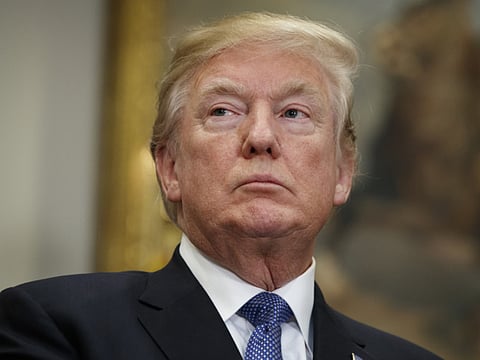Trump is in confrontation with the world
His action on occupied Jerusalem may twist the course of history, but this will likely come at a heavy price for the region’s people

Regardless of the national and external reasons behind his latest earth-shaking promise to Israel, United States President Donald Trump’s declaration in recognising occupied Jerusalem as the capital of Israel last Wednesday, is dangerously irresponsible to say the least. Trump claimed that by this decision, he was merely stating the obvious and reflecting the reality on the ground. In fact, no country in the world has ever recognised the unilateral step taken by Israeli parliament in 1980 in declaring occupied Jerusalem as “the eternal and united capital of the Jewish State”.
Furthermore, no US president before the current one, since the US Congress passing a vote on the issue in 1995 (that occupied Jerusalem was Israel’s capital), has ever dared to turn this piece of legislation into a reality so foolishly. To take such one-sided and illegal decision against the views of Arabs, Muslim countries and the world community is like playing with fire in a highly explosive region and that too at a time where the entire world is increasingly facing growing threats of terror and extremism.
The author of the well-known United Nations Security Council (UNSC) Resolution 242 for peace in the Middle East in November 1967, the late Lord Caradon (his real name is Hugh Foot) — the United Kingdom’s permanent representative at the UN (1964-1970) during the Harold Wilson Labour government — had always maintained that occupied Jerusalem had a special status in the world and no one side can determine its future on its own. Lord Caradon had told this writer in an interview in 1982 that occupied Jerusalem was “the key to final peace in the region. If no agreement over its final status between the Arabs and Israelis is reached, there’ll be no settlement in the Middle East. It is becoming clearer by the day that without peace in the Holy City, there can be no hope of peace in the entire region”.
Resolution 242, sponsored by UK, would never have been passed had it not been for the two super powers. It was unanimously passed by the UNSC because it tied up two main elements: The Soviet Union and Arab states’ demand that Israel withdraw from the Occupied Territories, and to American and Israeli demand of Arab recognition of Israel. The resolution briefly called for withdrawal of Israeli forces from the Occupied Territories, end of its belligerence, acknowledgment of sovereignty of every state in the area and their right to live in peace within secured and recognised boundaries and a just settlement of the refugee crisis.
Lord Caradon wrote a paper in 1980, published by the University of Michigan, titled ‘The future of Jerusalem: A Review for Proposals of the Future of the City’, in which he restated his position on the city. Caradon was one of the few remaining most experienced diplomats who was closely attached to his country’s colonial past in many areas of the region and beyond, particularly in Mandatory Palestine. He was effectively running the district of Nablus, until he was appointed the British military administrator of the eastern part of Libya, Cyrenaica (or Barqah) during the Second World War. He had also served as a colonial secretary in Jamaica (1945-19470), Nigeria (1947-1950) and became the last colonial governor and commander-in-chief of Cyprus, until it gained independence in 1960.
It is difficult to believe that the most important country in the world, US, would take such a dangerous step under the banners of ‘peace initiative’. What American President Donald Trump has done is simply turning a very recent history on its head by recognising occupied Jerusalem — the most sacred place for three major religions in the world — as the exclusive capital of Israel.
Whatever the US Congress or Israel’s Knesset says or does, the situation in occupied Jerusalem can be very simply stated. Up until the six-day war of June 1967, the Holy City was divided between Jordan and Israel. Then Israeli forces took Arab (or east) Jerusalem in addition to Sinai, Golan Heights, West Bank and Gaza. Successive Israeli governments moved fast to declare the annexation of all of Jerusalem and extend its municipal boundaries. Israel has, since then, repeatedly restated its illegal claim to keep control and hold of all of Jerusalem, leading up to the Knesset vote in 1980, during the first Likud government of former prime minister Menachem Begin, that Jerusalem “must forever be the united capital of Israel”.
This is an issue around which Arabs and all Muslims are strongly united. Even the Arab partner of the Camp David agreement, Anwar Sadat, the late Egyptian president, had pledged that he would never bargain for the Arab identity of occupied East Jerusalem. All that Arab and Muslim nations, as well the vast majority of the international community, have demanded is that the holy sites of Islam in occupied East Jerusalem be freed from Israeli control and sovereignty and that the city should become the capital of a future Palestinian state.
Historically speaking, and regardless of what Trump or Israeli Prime Minister Benjamin Netanyahu may say, occupied Jerusalem was the capital of Palestine until the 1948 war when the British mandated authority divided the city and the country. In 1948, the well-trained and colonially supported Zionist militias occupied West Jerusalem. In 1967, Israel occupied the other part of the city as well as the whole of Palestine. Trump’s recognition simply grants Israel the green light to further its colonial project. His action may unfortunately twist the path of history, but this would likely come at a heavy price for the region’s people and for western interests in the region, too.
Mustapha Karkouti is a columnist and former president of the Foreign Press Association, London. Twitter: @mustaphatache


